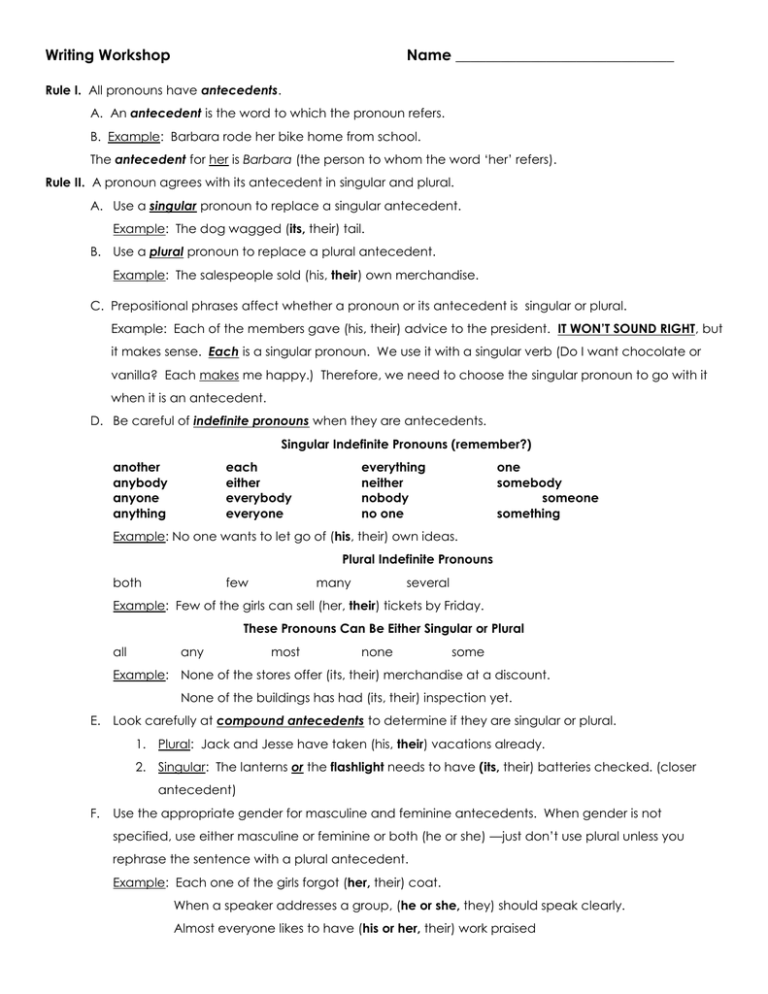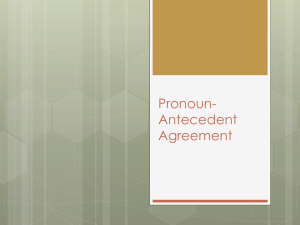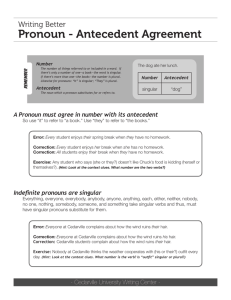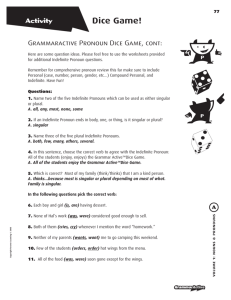Agreement: Pronoun/Antecedent
advertisement

Writing Workshop Name _____________________________ Rule I. All pronouns have antecedents. A. An antecedent is the word to which the pronoun refers. B. Example: Barbara rode her bike home from school. The antecedent for her is Barbara (the person to whom the word ‘her’ refers). Rule II. A pronoun agrees with its antecedent in singular and plural. A. Use a singular pronoun to replace a singular antecedent. Example: The dog wagged (its, their) tail. B. Use a plural pronoun to replace a plural antecedent. Example: The salespeople sold (his, their) own merchandise. C. Prepositional phrases affect whether a pronoun or its antecedent is singular or plural. Example: Each of the members gave (his, their) advice to the president. IT WON’T SOUND RIGHT, but it makes sense. Each is a singular pronoun. We use it with a singular verb (Do I want chocolate or vanilla? Each makes me happy.) Therefore, we need to choose the singular pronoun to go with it when it is an antecedent. D. Be careful of indefinite pronouns when they are antecedents. Singular Indefinite Pronouns (remember?) another anybody anyone anything each either everybody everyone everything neither nobody no one one somebody someone something Example: No one wants to let go of (his, their) own ideas. Plural Indefinite Pronouns both few many several Example: Few of the girls can sell (her, their) tickets by Friday. These Pronouns Can Be Either Singular or Plural all any most none some Example: None of the stores offer (its, their) merchandise at a discount. None of the buildings has had (its, their) inspection yet. E. Look carefully at compound antecedents to determine if they are singular or plural. 1. Plural: Jack and Jesse have taken (his, their) vacations already. 2. Singular: The lanterns or the flashlight needs to have (its, their) batteries checked. (closer antecedent) F. Use the appropriate gender for masculine and feminine antecedents. When gender is not specified, use either masculine or feminine or both (he or she) —just don’t use plural unless you rephrase the sentence with a plural antecedent. Example: Each one of the girls forgot (her, their) coat. When a speaker addresses a group, (he or she, they) should speak clearly. Almost everyone likes to have (his or her, their) work praised Write an A over the antecedent for the pronoun choice in parentheses, then write S or P next to the number of the sentence to indicate singular or plural. Finally, circle the pronoun that agrees with its antecedent. ____ 1. A reporter talked to Mrs. Bea Zwack after (her, their) home was struck by a tornado. ____ 2. Jack Zwack spent most of (his, their) time cleaning up the yard. ____ 3. Nick, Mack, and Patty Zwack are staying with (his or her, their) neighbors for the time being. ____ 4. The Zwacks now have a healthy respect for tornadoes and (its, their) power. ____ 5. The reporter finally submitted (her, their) assignment to the editor of the paper. ____ 6. The newspaper featured tornadoes on (its, their) front page. ____ 7. Subscribers that read the story and saw the pictures realize that (he or she, they) could have been the victims of the storm. ____ 8. A mature person is responsible for (his or her, their) actions. ____ 9. The detective told (his or her, their) chief that (he or she, they) had caught the criminal. ____ 10. Each of the Olympic champions proudly wore (his, their) medal. ____ 11. Either the professional craftsmen or the amateur woodworkers enjoyed working with (his or her, their) hands. ____ 12. Almost anybody who has worked with wood would say that woodworking soothes (his or her, their) spirit. ____ 13. Each of the Hopi Indian fathers carved (his, their) daughter a kachina doll from cottonwood root. ____ 14. Every one of the Iroquois carvers used basswood for (his or her, their) healing ritual mask. ____ 15. One of the wooden masks from the Pacific Northwest shows by (its, their) detail the customs of the tribe. ____ 16. Each of my sisters has tried (her, their) hand at whittling. ____ 17. Neither cut (herself, themselves). ____ 18. Everybody used to buy (his or her, their) tobacco at the store with the carved wooden bear in front. ____ 19. Anybody who likes (his or her, their) home uncluttered with detail would appreciate the simple wooden furniture made by the Quakers. ____ 20. Everyone, including Queen Victoria, wished (he or she, they) could own the fancy Victorian furniture painstakingly carved by William Bartels.




